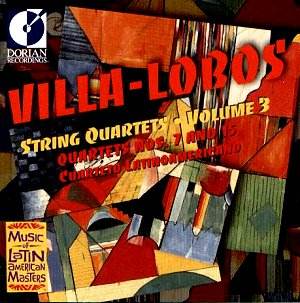Admiration undimmed for these inventive, life-enhancing
works we now reach Volume 3. The Seventh (1942) is the longest
of all Villa-Lobos’s quartets and shows him at his finest. Melodies
both confident and yielding run throughout the opening movement.
Rhythmically, what a master he was. The rhythm is both sinuous
and seamless, the slower sections integrated without a bump, and
there’s a glorious melody for viola (maybe Javier Montiel could
have sung out just a bit more) that warms the heart. In the Andante
it’s the turn of the composer’s own instrument, the cello, to
sing. This is a contemplative, slightly insistent movement, free-moving
and then interrupted by a piu mosso section that features some
folk song melodies. But with Villa-Lobos expressive depth is always
around the corner as it is here. The Scherzo is a jocular, folksy
one with another good opportunity for the cellist to be strong,
leonine and commanding; as ever pizzicati enliven a Scherzo but
lest I give the impression that this is formulaic and predictable
writing I should say that Villa-Lobos’s technical powers are exceptionally
strong and the myriad expressive nuances at his disposal are employed
in ways ever more various. There’s no boredom in a Villa-Lobos
quartet; these are some of the most complete and satisfying works
in the twentieth century canon and the decisively confident Allegro
conclusion to the 7th shows it. Dramatic and forward-moving,
themes pile up like a car smash – and the amazing thing is the
fluidity and clarity of the lyricism that still emerges. There
is some demanding writing – and listening too – but there are
also graceful dancing and consolatory moments as well. A lyrically
incisive and triumphant conclusion rounds things off.
Try the opening of the Fifteenth for an arresting
chordal call to arms. This is a very concise work – the Scherzo
doesn’t even last two minutes – but there’s plenty of incident,
from the bristly fugato and neo-classicism of the opening movement
to the muted strings of the second. Here a spectral, mordant air
is generated and the atmosphere is palpable and developed with
the most devastatingly decisive of instrumental means. Try this
to appreciate just what Villa-Lobos can do. That sliver of a Scherzo
vanishes with a dramatic blink and the concluding Allegro finale
is generous in character even if it does indulge some fugal development.
In its slimness and its concision this is a notably successful
work. As ever documentation, performances and sound quality –
for the third volume recording locations have moved from Troy,
New York to Mexico City – are first class.
Jonathan Woolf
Other
reviews
Volume
1
Volume
2
Volume
3
Volume
4
Volume
5
Volume
6
